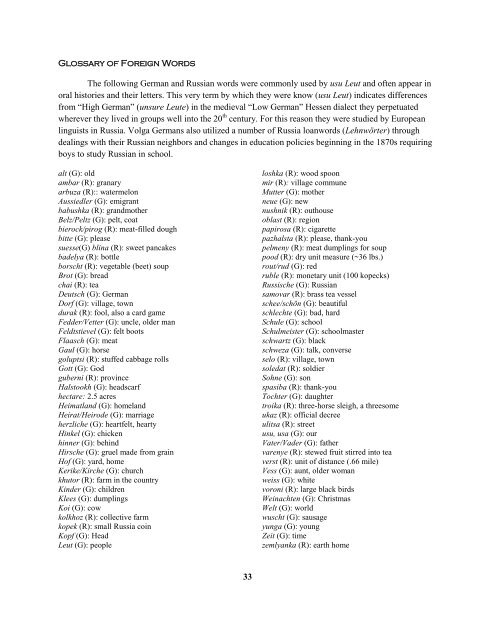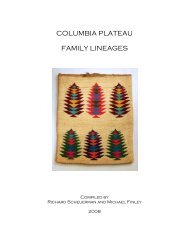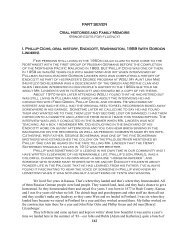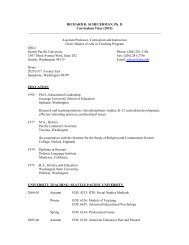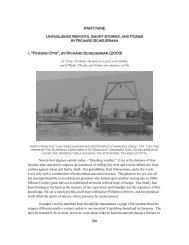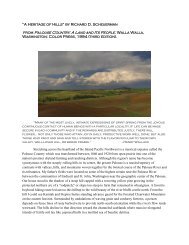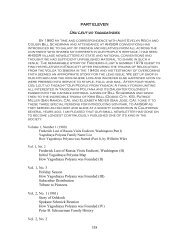THE BERRY MEADOW ARCHIVE - Mountain Light School
THE BERRY MEADOW ARCHIVE - Mountain Light School
THE BERRY MEADOW ARCHIVE - Mountain Light School
You also want an ePaper? Increase the reach of your titles
YUMPU automatically turns print PDFs into web optimized ePapers that Google loves.
Glossary of Foreign Words<br />
The following German and Russian words were commonly used by usu Leut and often appear in<br />
oral histories and their letters. This very term by which they were know (usu Leut) indicates differences<br />
from “High German” (unsure Leute) in the medieval “Low German” Hessen dialect they perpetuated<br />
wherever they lived in groups well into the 20 th century. For this reason they were studied by European<br />
linguists in Russia. Volga Germans also utilized a number of Russia loanwords (Lehnwörter) through<br />
dealings with their Russian neighbors and changes in education policies beginning in the 1870s requiring<br />
boys to study Russian in school.<br />
alt (G): old<br />
ambar (R): granary<br />
arbuza (R):: watermelon<br />
Aussiedler (G): emigrant<br />
babushka (R): grandmother<br />
Belz/Peltz (G): pelt, coat<br />
bierock/pirog (R): meat-filled dough<br />
bitte (G): please<br />
suesse(G) blina (R): sweet pancakes<br />
badelya (R): bottle<br />
borscht (R): vegetable (beet) soup<br />
Brot (G): bread<br />
chai (R): tea<br />
Deutsch (G): German<br />
Dorf (G): village, town<br />
durak (R): fool, also a card game<br />
Fedder/Vetter (G): uncle, older man<br />
Feldtstievel (G): felt boots<br />
Flaasch (G): meat<br />
Gaul (G): horse<br />
goluptsi (R): stuffed cabbage rolls<br />
Gott (G): God<br />
guberni (R): province<br />
Halstookh (G): headscarf<br />
hectare: 2.5 acres<br />
Heimatland (G): homeland<br />
Heirat/Heirode (G): marriage<br />
herzliche (G): heartfelt, hearty<br />
Hinkel (G): chicken<br />
hinner (G): behind<br />
Hirsche (G): gruel made from grain<br />
Hof (G): yard, home<br />
Kerike/Kirche (G): church<br />
khutor (R): farm in the country<br />
Kinder (G): children<br />
Klees (G): dumplings<br />
Koi (G): cow<br />
kolkhoz (R): collective farm<br />
kopek (R): small Russia coin<br />
Kopf (G): Head<br />
Leut (G): people<br />
33<br />
loshka (R): wood spoon<br />
mir (R): village commune<br />
Mutter (G): mother<br />
neue (G): new<br />
nushnik (R): outhouse<br />
oblast (R): region<br />
papirosa (R): cigarette<br />
pazhalsta (R): please, thank-you<br />
pelmeny (R): meat dumplings for soup<br />
pood (R): dry unit measure (~36 lbs.)<br />
rout/rud (G): red<br />
ruble (R): monetary unit (100 kopecks)<br />
Russische (G): Russian<br />
samovar (R): brass tea vessel<br />
schee/schön (G): beautiful<br />
schlechte (G): bad, hard<br />
Schule (G): school<br />
Schulmeister (G): schoolmaster<br />
schwartz (G): black<br />
schweza (G): talk, converse<br />
selo (R): village, town<br />
soledat (R): soldier<br />
Sohne (G): son<br />
spasiba (R): thank-you<br />
Tochter (G): daughter<br />
troika (R): three-horse sleigh, a threesome<br />
ukaz (R): official decree<br />
ulitsa (R): street<br />
usu, usa (G): our<br />
Vater/Vader (G): father<br />
varenye (R): stewed fruit stirred into tea<br />
verst (R): unit of distance (.66 mile)<br />
Vess (G): aunt, older woman<br />
weiss (G): white<br />
voroni (R): large black birds<br />
Weinachten (G): Christmas<br />
Welt (G): world<br />
wuscht (G): sausage<br />
yunga (G): young<br />
Zeit (G): time<br />
zemlyanka (R): earth home


